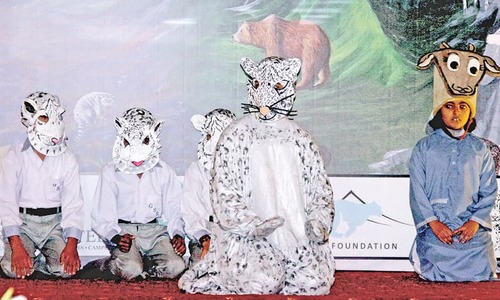Once a common sight in the skies of Pakistan, today the white-backed vulture is facing extinction — its population devastated by the use of industrial drugs to breed the cattle whose carcasses they traditionally feed on.
Bird numbers have plummeted by more than 99 per cent since the 1990s, according to the local branch of the World Wildlife Fund (WWF), which is desperately attempting to ensure the species does not die out.
“Once vultures were found in a very good number in Pakistan,” explains Warda Javed, coordinator for the WWF backed Vulture Restoration Project.
But due to several threats — principally the use of the anti-inflammatory drug Diclofenac, which causes kidney failure, the birds are dying out.

In a vast screened enclosure in the eastern forest of Changa Manga, about 100 kilometres from Lahore, some 20 Gyps Bengalensis — or the white-backed vultures — wait patiently for their dinner, traditionally made of donkey and goat meat.
With plumage of white and ash grey, their powerful beaks fitted to long pink necks, they watch from their wooden perches, some ten metres above the ground. They boast a wingspan of two metres and weigh up to 7.5 kilogrammes.
Locked up, at least they are safe: the goal is to keep the species alive until outside conditions improve enough for them to be released.
Diclofenac is used as a painkiller by livestock breeders in Pakistan.
Vultures consume the meat off the carcasses of the cattle and so ingest the drugs, which wreak havoc with their systems.

The WWF is lobbying authorities, veterinarians and pharmaceutical companies for the replacement of Diclofenac with an alternative, Meloxicam, which is safer for the birds.
Diclofenac was banned in neighbouring India in 2006 after it was also blamed for destroying the vulture population there, which went from millions to just a few thousand in little more than a decade, but it remains in use in Pakistan.
Symbols of death
At the Vulture Restoration Project in Changa Manga they are playing the long game.
Four vulture babies were born in the last two years through the centre's breeding programme, but it will be years before they are released into the wild.
“Up till 2020, we don't have any release plans until we have a controlled environment outside this centre as well,” Javed explains, warning that even if Diclofenac is banned in Pakistan, other drugs used in cattle breeding can cause problems for the birds.
There are eight species of vultures in Pakistan, two of which — the white-backed vulture and the Indian vulture — are critically endangered.

Principally scavengers that feast on carcasses, the birds have long been associated with death: an issue compounded on the Indian subcontinent as they have also been used to dispose of human remains as part of the centuries-old tradition of Dakhma, the funeral process of the Zoroastrian community known as the Parsis.
Bodies were first put on top of mountains and later on placed on top of specially-built structures known as 'Towers of Silence', where the flesh was devoured by the birds. But the Parsi community is dwindling in India and Pakistan, and the custom is fading.

The association with death and misfortune, however, still lingers; making it hard to galvanise public sympathy for the creatures' dire plight.
Fatima Arif of WWF-Pakistan concedes that for most people, vultures evoke negative emotions, but is hopeful the charity can help them improve their image.
“We are trying to gather the general public to let them know that the myths that are generally associated with this species are not really based on any fact but they are just folklore,” she says.
Arif adds: “Vultures are very shy birds, they are very caring parents.”













































